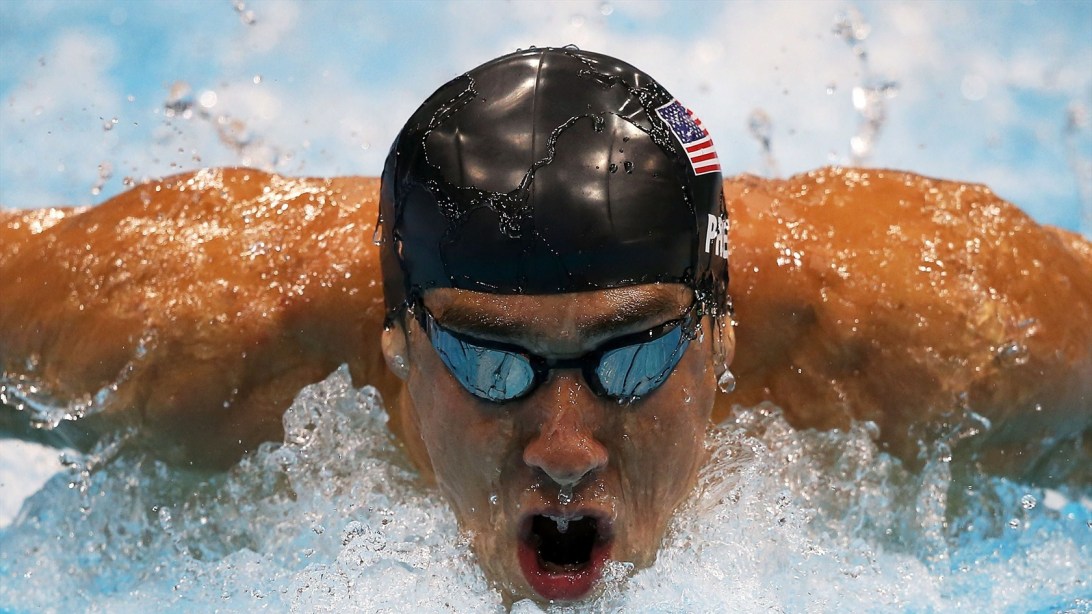Day Four and another success for Team GB as the Eventing Team held on to their overnight position to take a well-deserved Silver Medal. I hope that their Royal team member can avoid some of the headlines, particularly the ones in the Daily Mail which suggest that she lost the team the Gold Medal through her making one crucial error. Technically, of course, the error was made by her horse, and it was hardly crucial when there were four other team members who also made small individual mistakes during the four days of the contest; that’s why it was called a ‘team event’.

USA’s Michael Phelps en route yesterday to becoming the most successful Olympian ever, when he won his 15th Gold for swimming, his 19th Medal overall.
One expects uninformed commentary from tabloids, particularly around sports that are not mainstream, but this has to be one of the dopiest in the long and undistinguished history of that particular rag. So how do you pass a dope test? Well first you need to sound like one – a good check there is to ensure that your brain is not fully-engaged before opening your mouth. Then you need to make sure that you’re talking to a reporter with an agenda. Most of all, you need to make sure that reporter is a member of the news arm of the BBC, and particularly one with a reputation to make within a two-week window of opportunity.
All of these easy-to-remember tips were exhibited yesterday by Dick Pound, captioned as ‘Former President of the World Anti-doping Agency’ when he piled-in on the controversy surrounding a 16-year-old Chinese swimmer during an interview he gave to the BBC’s so-called Sports Editor, David Bond: “The trouble is,” Pound said, “with all the suspicions about drug use throughout sport, when something is really, really spectacular, the first thing you do after seeing the performance is say, hmm, I wonder.” What the caption failed to mention was that Mr Pound has a history of questionable brain-engagement, and has not been free of his own involvement in controversies over the past few years, most of which centred on his making unsubstantiated and sweeping statements about rife usage of drugs in specific sports. There is often a reason why someone is captioned as being ‘Former’.
The potential for scandal was first raised by a US Swimming coach, who questioned how Chinese swimming sensation Ye Shewin could possibly have improved her personal best time in the 400m individual relay by over five seconds – in context that’s under two per cent. Although half of that improvement came between heat and final here in London, he failed to mention that the other half had come over a two-year period leading-up to the games, during which time Ye had gone from a 14-year-old junior swimmer to a 16-year-old senior champion.
The organisers were quick to point-out that all of her samples at these games have come back clean, as had all of the random samples taken during those intervening years. The latest samples had been processed through our own new multi-million pound drugs testing lab that has already sussed a number of cheats within hours of their performances. Even ‘The Thorpedo’ weighed-in on behalf of the youngster during the sporting side of the BBC’s coverage. Ian Thorpe is one of the pundits in the BBC studio, and he pointed out how he improved his time for one event by five seconds between the ages of fifteen and sixteen. Yet nobody seemed to question that at the time.
So what is the basis for these claims about Ye Shewin coming from such lofty perches? Are the accusers aware of a new cheating-methodology that they are not revealing, and if so how do they know of it? Or is it just sour grapes? Well, neither matters when you are trawling, or trolling in David Bond’s case, for negativity. His report about this was the very first item on the evening news and, as usual, had little to do with sporting newsworthiness. “She’s been at the centre of London’s first big Olympic storm,” he commenced, conveniently avoiding to mention that it was he who was brewing the storm up in the first place. “The Olympics are all about memorable record breaking moments,” Bond continued, “the problem is the Games have had such a history of drugs scandals, that any stand-out performance is bound to arouse suspicions.” After such a sweeping statement, Team GB members will need to take full-account of such a BBC agenda before they obey their other demands around Gold-Medal performances.
Ye Shewin won her second Gold yesterday but, according to David Bond’s blinkered viewpoint, this time she ‘only’ broke the Olympic Record. He concluded his report with the throwaway line: “Shiwen insists she has never used drugs, and may wonder what she has done to deserve all this suspicion, but her victory tonight is only likely to fuel the whispering campaign.” That would be the whispering campaign ostensibly being led by someone with the title BBC Sports Editor.
Yesterday there were thousands of complaints from the British public about a single social media comment sent to one of our divers. Today there are millions of social media complaints being posted by the Chinese public about the comments being made about one of their swimmers. As London 2012 has been dubbed the first Social Media Games, I have an open question for the Director General of the BBC:
Why is a member of the public arrestable for making cruel and personal comments on a social media site about a teenage British sportsperson, but a highly-paid journalist is not when he utters cruel and unsubstantiated innuendo on the main news about a foreign teenage sportsperson?
